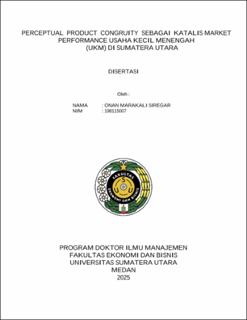Perceptual Product Congruity sebagai Katalis Market Performance Usaha Kecil Menengah (UKM) di Sumatera Utara
Perceptual Product Congruity as A Catalyst of Market Performance of Small and Medium Enterprises (SMEs) in North Sumatra

Date
2025Author
Siregar, Onan Marakali
Advisor(s)
Lubis, Arlina Nurbaity
Rini, Endang Sulistya
Silalahi, Amlys Syahputra
Metadata
Show full item recordAbstract
The development of technology and globalization has significantly impacted the operations of Small and Medium Enterprises (SMEs) in North Sumatra, but challenges such as limited market access, low innovation, and the utilization of digital technology still hinder competitiveness. For that reason, SMEs need to adopt innovation and marketing strategies that align with consumer perceptions, formulated in the concept of Perceptual Product Congruity (PPC). This study aims to examine how innovative performance, marketing ability, and product benefits affect the market success of SMEs in North Sumatra, using perceptual product congruity as a middle factor. A quantitative method using Structural Equation Modeling (SEM) was used to study 334 SMEs (201 small businesses and 133 medium businesses) chosen through a random sampling method. The analysis includes validity and reliability tests, outer and inner model assessments, as well as advanced analyses such as Importance–Performance Map Analysis (IPMA) and Multi-Group Analysis (MGA). The research results show that Innovative Performance, Marketing Capability, Product Advantage, and Perceptual Product Congruity directly and significantly influence Market Performance. Innovative performance also significantly influences marketing capability, product advantage, and perceptual product congruity. Furthermore, marketing capability and product advantage have a direct significant influence on perceptual product congruity. Indirectly, perceptual product congruity mediates the influence of innovative performance, marketing capability, and product advantage on market performance. Additionally, marketing capability and product advantage also mediate the influence of innovative performance on market performance. Thus, perceptual product congruity, marketing capability, and product advantage play a crucial role as important catalysts in strengthening the impact of innovation on market performance. The IPMA analysis identifies innovative performance as a strategic development priority, while the MGA reveals differences in influence between SME locations (Medan vs. outside Medan). Strengthening innovation and marketing capabilities enables SMEs to create products that better align with consumer perceptions, ultimately driving sustainable improvements in market performance.
